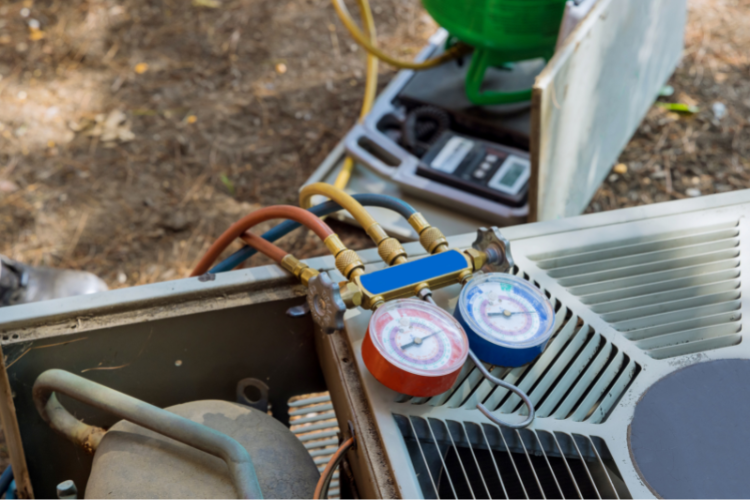Repairing Your Old HVAC vs. Buying a New One: Which Is Cheaper?
When it comes to heating and cooling your home, the HVAC system is a crucial component. It can be a significant investment, and it’s important to make the right decision when it comes to maintaining or replacing it. But how do you know whether it’s cheaper to repair your old HVAC system or buy a new one? Here’s what you need to consider.
Age of the HVAC system
The age of the HVAC system is an important factor to consider when deciding whether to repair or replace it. Most HVAC systems have a lifespan of around 15-20 years, although some may last longer with proper maintenance. As systems age, they may become less efficient and may require more frequent repairs. If your HVAC system is approaching or has surpassed this age range, it may be more cost-effective to replace it rather than continue to repair it. This is because the cost of repairing an older system that is prone to issues can quickly add up, and investing in a new system may be more cost-effective in the long run. In addition to the potential cost savings, replacing an old HVAC system with a newer model can also bring the benefit of increased energy efficiency, which can lead to lower energy bills and a more comfortable home. It’s important to weigh the age of the system and the potential cost savings of a replacement versus the cost of repairing the system when making this decision.
Condition of the HVAC system
The condition of the HVAC system is an important factor to consider when deciding whether to repair or replace it. If the system is in relatively good condition and has only had a few minor issues, repairing it may be the more cost-effective option. In this case, it may be worth investing in repairs to extend the lifespan of the system and avoid the upfront cost of a replacement. However, if the system is consistently experiencing problems or has major issues, it may be more cost-effective to replace it. This is because the cost of repairing a system that is in poor condition or has multiple issues can quickly add up, and it may be more cost-effective in the long run to invest in a new system. In addition to the potential cost savings, replacing a system that is consistently experiencing problems or has major issues can also bring the benefit of increased reliability and comfort in your home. When deciding whether to repair or replace your HVAC system, it’s important to consider the current condition of the system and the potential cost savings of a replacement versus the cost of repairs.
Repair costs
When deciding whether to repair or replace your HVAC system, the cost of the repairs is an important factor to consider. If the cost of the repairs is more than half the cost of a new HVAC system, it may be more cost-effective to replace the system rather than continue to repair it. This is because investing in a new system may provide long-term cost savings through increased energy efficiency and reduced repair costs. However, it’s worth getting a few estimates from different HVAC contractors to ensure you’re getting the best price for the repairs. It’s also important to consider the long-term costs of repairing an older system versus investing in a new one. If your system is consistently requiring repairs, the cost of those repairs over time may be more than the cost of a new system. In this case, it may be more cost-effective to invest in a new system, even if the upfront cost is higher.
Energy efficiency
Energy efficiency is an important factor to consider when deciding whether to repair or replace your HVAC system. Newer HVAC systems are generally more energy efficient than older models, which means they use less energy to heat and cool your home. This can result in lower energy bills and can be an important cost-saving consideration when deciding whether to repair or replace your system. In addition to lower energy bills, a more efficient HVAC system may also be more reliable and require fewer repairs, further reducing the overall cost of ownership. If your old HVAC system is not energy efficient, replacing it with a newer, more efficient model could save you money in the long run. However, it’s important to consider the upfront cost of a new system and weigh it against the potential long-term cost savings through energy efficiency and reduced repair costs before deciding to replace or repair your unit.
Rebates and incentives
Rebates and incentives can be an important factor to consider when deciding whether to repair or replace your HVAC system. Many utility companies and manufacturers offer rebates and incentives for replacing old, inefficient HVAC systems with newer, more efficient models. These can help offset the upfront cost of a new system and make it more cost-effective. It’s worth checking with your local utility company or the manufacturer of the new HVAC system to see if any rebates or incentives are available. In addition to rebates and incentives offered by utility companies and manufacturers, there may also be federal, state, or local incentives available for upgrading to an energy-efficient HVAC system. These could include tax credits, grants, or low-interest financing options. It’s worth researching the rebates and incentives that are available to you when deciding whether to repair or replace your HVAC system.
Maintenance and repair history
The maintenance and repair history of your HVAC system can be an important factor to consider when deciding whether to repair or replace it. If the system has a history of frequent repairs or has required major repairs in the past, it may be more cost-effective to replace it rather than continue to repair it. This is because the cost of repairing an older system that is prone to issues can quickly add up, and investing in a new system may be more cost-effective in the long run. In addition to the potential cost savings, replacing a system that has a history of frequent repairs or major issues can also bring the benefit of increased reliability and comfort in your home. On the other hand, if the system has a good maintenance and repair history and has only had a few minor issues, repairing it may be the more cost-effective option. In this case, it may be worth investing in repairs to extend the lifespan of the system and avoid the upfront cost of a replacement.
If you’re interested in learning more about how we can help with your HVAC needs, please don’t hesitate to contact us. Our team of experienced professionals is here to help with all of your HVAC needs, from repairs and maintenance to installation and replacement. We offer competitive pricing and high-quality services, and we’re dedicated to helping our customers keep their homes comfortable and energy efficient. Contact us today to schedule a consultation and see how we can help you with your HVAC needs.

